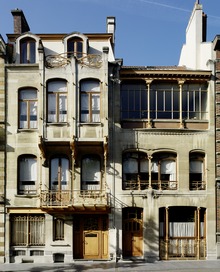The Horta Museum (French: Musée Horta; Dutch: Hortamuseum) is a museum in Brussels, Belgium, dedicated to the life and work of the architect Victor Horta and his time. The museum is housed in Horta's former town house and workshop (French: Maison et Atelier Horta, Dutch: Woning en Atelier Horta), built between 1898 and 1901, in Art Nouveau style. It is located at 23–25, rue Américaine/Amerikaansestraat in the municipality of Saint-Gilles.
| Horta Museum | |
|---|---|
 Main façade of the Horta Museum | |
 | |
| General information | |
| Type | Town house and workshop |
| Architectural style | Art Nouveau |
| Address | Rue Américaine / Amerikaansestraat 23–25 |
| Town or city | 1060 Saint-Gilles, Brussels-Capital Region |
| Country | Belgium |
| Coordinates | 50°49′27″N 4°21′17″E / 50.82417°N 4.35472°E |
| Construction started | 1898 |
| Completed | 1901 |
| Client | Victor Horta |
| Design and construction | |
| Architect(s) | Victor Horta |
| Official name | Major Town Houses of the Architect Victor Horta (Brussels) |
| Type | Cultural |
| Criteria | i, ii, iv |
| Designated | 2000 (24th session) |
| Reference no. | 1005 |
| Region | Europe and North America |
| References | |
| [1] | |
Housed in the Art Nouveau interiors is a permanent display of furniture, utensils and art objects designed by Horta and his contemporaries, as well as documents related to his life and time. The museum also organises temporary exhibitions on topics related to Horta and his art.
Together with three other town houses of Victor Horta, it was added to the UNESCO World Heritage list in 2000 as the core of epoch-making urban residences that Horta designed before 1900.[2]
Awards
editThe UNESCO commission recognised the Horta Museum as UNESCO World Heritage in 2000, as part of the listing 'Major Town Houses of the Architect Victor Horta':
The four major town houses—Hôtel Tassel, Hôtel Solvay, Hôtel van Eetvelde, and Maison & Atelier Horta—located in Brussels and designed by the architect Victor Horta, one of the earliest initiators of Art Nouveau, are some of the most remarkable pioneering works of architecture of the end of the 19th century. The stylistic revolution represented by these works is characterised by their open plan, the diffusion of light, and the brilliant joining of the curved lines of decoration with the structure of the building.[2]
An extensive restoration project was completed in 2013. In 2014, it won the European Union Prize for Cultural Heritage / Europa Nostra Award.[3][4]
Gallery
edit-
Horta's house and workshop in the early 20th century
-
The balcony
-
Doorbell
-
Spiral staircase
-
Skylight above the stairway
-
Closeup of the skylight
-
Peacock Chair by Horta from either the Hôtel Tassel or the Castle of La Hulpe
-
Table by Horta, probably designed for the 1902 Turin International Exposition
See also
editReferences
editCitations
edit- ^ Région de Bruxelles-Capitale (1997–2004). "Ancienne maison et atelier de Victor Horta. Musée Horta" (in French). Brussels. Retrieved 28 July 2022.
- ^ a b "Major Townhouses of the Architect Victor Horta (Brussels)". UNESCO. Retrieved 22 September 2017.
- ^ "Awards". Europa Nostra. Retrieved 20 January 2024.
- ^ "Press corner". European Commission - European Commission. Retrieved 20 January 2024.
Bibliography
edit- Aubry, Françoise; Vandenbreeden, Jos (1997). Horta: Art Nouveau to Modernism. New York: Harry N Abrams. ISBN 978-0-8109-6333-7.
Further reading
editExternal links
edit- Media related to Horta Museum at Wikimedia Commons
- Official website
- Horta Museum on BALaT - Belgian Art Links and Tools (KIK-IRPA, Brussels)